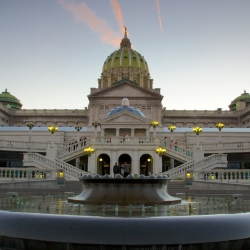After the Pennsylvania spending bill passed into law, the state’s long-awaited online gambling bill remains in limbo. Lawmakers might pass the iGaming bill in the next few weeks, but their stalemate might last into the fall.
The Pennsylvania legislature passed a $32 billion spending package on June 30. The details on how the state would pay for the spending were not included. That set up a seeming 10-day window in which the Pennsylvania Senate, House, and governor negotiated those details.
The main issue with the $32 billion package was the price tag was roughly $2.2 billion too high. (Some lawmakers argued the deficit was lower than $2.2 billion, as it was a 2-year budget.) To make up $700 million-a-year of that deficit, the Republican-controlled legislature called for an “omnibus gambling bill”.
Pennsylvania Omnibus Gambling Bill
The omnibus gambling bill is still on the table, but after an 11th hour proposal for satellite casinos, the various sides have not been able to agree on the exact details. Meanwhile, Gov. Tom Wolf allowed ten days to elapse on the original $32 billion spending bill.
After ten days without a veto, the bill automatically passes into law.
Now the state legislature has recessed for its mid-summer break. When the lawmakers adjourn in a few weeks, they will have to negotiate the budget’s details. A vocal minority of the legislature opposes revenue generation through “sin taxes”, as the bulk of the deficit would involve an expansion of alcohol sales and gambling.
Pennsylvania Online Gambling Provisions
Online gambling is a major provision in the omnibus gambling bill. Pennsylvania’s land-based casinos and racinos would be eligible to apply for an online gambling license. A poker-only gambling license would cost $7.5 million for 7 years. A license which would allow a gaming portal to operate an online card room and an online casino would cost $10 million for 7 years.
The subsequent cost of extending the gambling license would be taken out of the online gambling revenues. Like New Jersey, online casino and poker operators (or software development companies) would be allowed to partner with the state’s land-based operators, in order to provide world class technology and customer support. The question of whether “bad actor” provisions would be included remain open to debate, so PokerStars might or might not be barred from Pennsylvania online gambling.
Online gambling is expected to generate $120 million in revenues in the first year of operation. By the 5th year of operating, it is estimaged that Pennsylvania online gambling would generate as much as $450 million in revenues.
Pennsylvania Daily Fantasy Sports
Daily fantasy sports also would be legalized under both the House and Senate versions of the omnibus gambling bill. Operators like FanDuel and DraftKings would apply for licenses, while upholding consumer protection, age verification, responsible gaming, and fund segregration standards. Regulated DFS is considered a minor part of the bill, as it would generate $5 million a year in revenues.
Airport Tablet Computer Betting
International airports in Pennsylvania would have the right to operate mobile tablet computer gambling. Licensing would cost different amounts, based upon on the international airport in question. Also, the Arnold Palmer Regional Airport about 30 miles outside Pittsburgh could buy a gaming license.
Pennsylvania Satellite Casinos
At the last minute, a proposal for up to 10 “satellite casinos” was discussed. The land-based casinos and racinos of Pennsylvania would have the right to buy an additional casino license for slots-in-a-box type satellite casinos. These would be built in mid-sized cities in Pennsylvania, though a rule forbids a new gaming venue to be built within 25 miles of an existing casino.
The number of gaming machines and type of gaming in these new venues would be optional. The casinos would hold between 100 and 500 gaming machines. For additional money, a satellite casino could have up to 40 gaming tables. The total package is thought to be worth about $300 million-a-year in revenues.
The satellite casino legislation might be controversial moving forward. A spokesman for Penn National Gaming complained that over 50% of their racetrack’s customers come from more than 25 miles out, so the bill in its June 10th form would devastate their business.
Video Gambling Terminals Are Out
Video gambling terminals (VGTs), an even more controversial part of the legislation, is out of the legislation. The VGTs, also known as video lottery terminals (VLTs), would have allowed taverns to place a small number of gaming machines on their premises. In the last few days before the June 10 deadline, VGTs were taken off the table.
The VGT clauses were opposed by the Sands Bethlehem Resort and Casino, which spent $1 million to fund “Pennsylvanians For Responsible Gaming”. PFRG used similar tactics to the Las Vegas Sands’ more famous political action committee, the Committee to Stop Internet Gambling (CSIG), which once ran attack ads against State Rep. John Payne. In the Pennsylvanians For Responsible Gaming ads, Pennsylvania was called “The Land of 12,000 Casinos”. Their commercials stated that the VGT legislation would place gaming machines in laundrymats and nursing homes.
The lobbying and public opinion campaign worked. Lawmakers decided to take the VGT legislation off the table, because they did not want to cannibalize the slot machine revenues in existing casinos and racinos.

